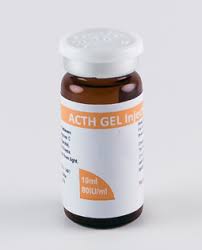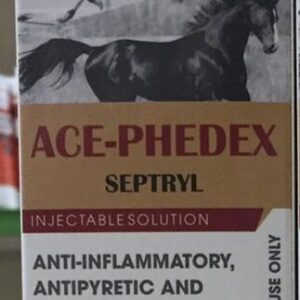Dexamed
Dosage and Administration:
The dosage of Dexamed depends on the species, size, and specific condition being treated. It is typically administered under the guidance of a veterinarian:
Route of Administration: Intramuscular (IM), Intravenous (IV), or Subcutaneous (SC), depending on the urgency and condition.
Frequency: Single or multiple doses may be administered depending on the condition, and sometimes a tapering dose is needed to prevent withdrawal effects.
Side Effects and Risks:
As with all corticosteroids, Dexamed carries a risk of side effects, especially with long-term use:
Laminitis in Horses: Long-term or high-dose use in horses can increase the risk of laminitis, a painful and debilitating hoof condition.
Immunosuppression: Prolonged use suppresses the immune system, making the animal more susceptible to infections.
Delayed Wound Healing: Glucocorticoids can slow the healing of wounds.
Increased Thirst and Urination: Animals may experience polydipsia (excessive thirst) and polyuria (increased urination).
Weight Gain and Muscle Wasting: Long-term use can lead to Cushing’s disease, causing weight gain, muscle loss, and other hormonal imbalances.
Gastrointestinal Issues: Extended use may increase the risk of gastrointestinal ulcers, particularly in horses and dogs.
Behavioral Changes: Some animals may become restless or irritable.
Precautions:
Pregnancy: Dexamed should be used cautiously in pregnant animals, as it may cause abortion or premature birth.
Pre-existing Conditions: Animals with diabetes, active infections, or gastrointestinal ulcers should be closely monitored while on corticosteroids, as Dexamed can exacerbate these conditions.
Tapering: Long-term use of Dexamed should be tapered off gradually to avoid adrenal insufficiency, where the body cannot produce its own cortisol after prolonged suppression by the drug.
Contraindications:
Active Infections: Animals with active bacterial, viral, or fungal infections should not receive Dexamed unless they are being treated with appropriate antimicrobial therapy.
Hypersensitivity: Animals with known allergies to Dexamethasone or corticosteroids should avoid the drug.
Vaccinations: Live vaccines should not be administered to animals receiving corticosteroids like Dexamed, as the immune response may be suppressed.
Withdrawal Period (for food-producing animals):
If Dexamed is used in cattle or other livestock, a withdrawal period must be observed before slaughter or milk collection to ensure that no residues are present in the meat or milk. This period varies based on local regulations and should be followed carefully.
Storage:
Storage Conditions: Store Dexamed at room temperature, away from light and freezing conditions. Always refer to the product label for specific storage instructions.
Summary:
Dexamed Injection is a versatile corticosteroid used to treat inflammatory, allergic, immune-mediated, and respiratory conditions in a variety of animals.
Indications include arthritis, dermatitis, allergic reactions, asthma, autoimmune diseases, and shock.
Administration is usually by IM, IV, or SC injection.
Side Effects include laminitis (in horses), immunosuppression, weight gain, delayed wound healing, and behavioral changes.
Precautions: Use cautiously in pregnant animals and those with pre-existing conditions; tapering is required for long-term use.
Contraindications: Active infections, hypersensitivity, and recent live vaccinations.
Dexamed is a powerful drug with a wide range of applications, but it must be used carefully under the supervision of a veterinarian due to its potential side effects. If you need specific information about its use in a particular condition or species, feel free to ask!
Dexamed Injection is a veterinary medication containing Dexamethasone, a potent synthetic glucocorticoid with anti-inflammatory, immunosuppressive, and anti-allergic properties. It is used in animals like horses, cattle, dogs, cats, and other species to treat a variety of inflammatory, allergic, and immune-mediated conditions. Below is detailed information about Dexamed Injection:
Composition:
Active Ingredient: Dexamethasone (often in the form of dexamethasone sodium phosphate or dexamethasone acetate).
Formulation: Injectable solution, usually administered intravenously (IV), intramuscularly (IM), or subcutaneously (SC).
Packaging: Typically available in multi-dose vials, such as Dexamed 10 ml, though vial sizes may vary.
Mechanism of Action:
Dexamethasone is a synthetic corticosteroid that mimics the effects of naturally occurring glucocorticoids in the body. It works by:
Inhibiting inflammation: It blocks the production of pro-inflammatory substances like prostaglandins and cytokines, which are involved in the inflammatory process.
Suppressing the immune response: By reducing the activity of the immune system, Dexamed is useful in managing autoimmune diseases and allergic reactions.
Stabilizing cell membranes: It helps prevent the release of enzymes that cause tissue damage in inflammatory conditions.
Indications (What Dexamed Treats):
Dexamed Injection is used in various conditions where inflammation or immune suppression is needed, including:
1. Inflammatory Conditions:
Arthritis and Osteoarthritis: Reduces joint inflammation and pain associated with degenerative joint diseases, especially in horses, dogs, and cats.
Bursitis and Tendonitis: Helps manage inflammation of the bursa and tendons, often used in treating large animals like horses.
Laminitis: In horses, Dexamed may be used in early or controlled cases of laminitis, though corticosteroids must be used with caution due to the risk of exacerbating the condition.
2. Allergic Reactions:
Acute Allergic Reactions: Used for immediate relief from severe allergic reactions caused by insect bites, food allergies, drugs, or environmental allergens.
Allergic Dermatitis: Treats skin allergies in dogs, cats, and horses by reducing itching, redness, and swelling.
Hives (Urticaria): Quickly reduces swelling and irritation in animals suffering from hives.
3. Respiratory Diseases:
Chronic Obstructive Pulmonary Disease (COPD): In horses, Dexamed is used to treat COPD (also known as heaves), where it reduces airway inflammation, improving breathing.
Feline Asthma: Used in cats to manage chronic asthma by reducing inflammation in the airways.
4. Autoimmune Diseases:
Immune-Mediated Hemolytic Anemia (IMHA): Used to suppress the immune system in animals with autoimmune disorders that cause the body to attack its own red blood cells.
Pemphigus and Autoimmune Skin Disorders: Treats immune-mediated skin diseases, where the body’s immune system attacks healthy skin cells.
5. Shock and Trauma:
Septic Shock: Helps stabilize animals in shock by managing the body’s inflammatory response to infections.
Anaphylactic Shock: Used in emergencies to counter severe allergic reactions that cause life-threatening swelling and respiratory distress.
6. Eye Conditions:
Uveitis: Treats inflammation inside the eye (uvea) in horses, dogs, and cats, which can cause pain and lead to blindness if untreated.
Conjunctivitis: Reduces inflammation in the outer layers of the eye (conjunctiva).
7. Reproductive Issues:
Induction of Labor: Dexamethasone can be used to induce labor in some animals, such as cattle. However, this must be done with caution due to the risk of premature birth or abortion if not properly timed.
Pregnancy Complications: Sometimes used to manage inflammatory complications during pregnancy, though long-term or indiscriminate use should be avoided in pregnant animals.
8. Gastrointestinal Disorders:
Inflammatory Bowel Disease (IBD): In dogs and cats, Dexamed helps manage inflammation of the gastrointestinal tract, reducing symptoms like diarrhea, vomiting, and weight loss.
9. Skin Conditions:
Eczema and Dermatitis: Reduces itching, swelling, and redness associated with various skin conditions.
Contact Dermatitis: Relieves inflammation from contact with irritants or allergens.
10. Neurological Disorders:
Head Trauma or Spinal Cord Injury: Helps manage swelling in the brain or spinal cord following traumatic injuries, reducing the risk of long-term neurological damage.
11. Tumor and Cancer Care:
Lymphoma: Though not curative, Dexamed can help manage swelling and inflammation associated with cancers like lymphoma, providing palliative care.
Brain Tumors: Reduces swelling around brain tumors, improving neurological symptoms and quality of life.




Reviews
There are no reviews yet.